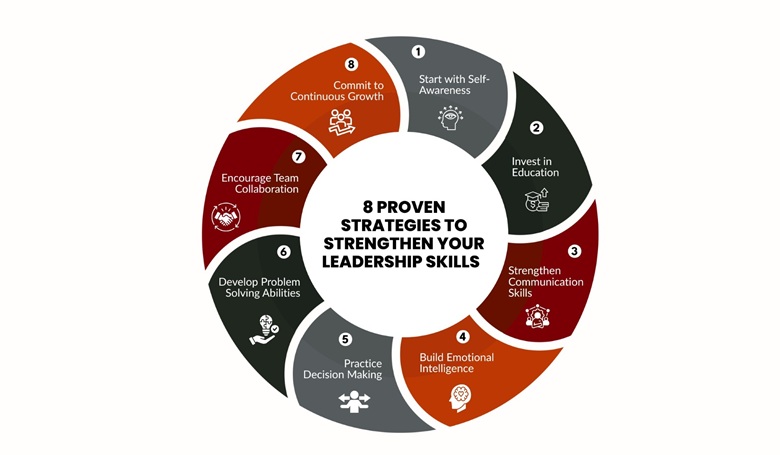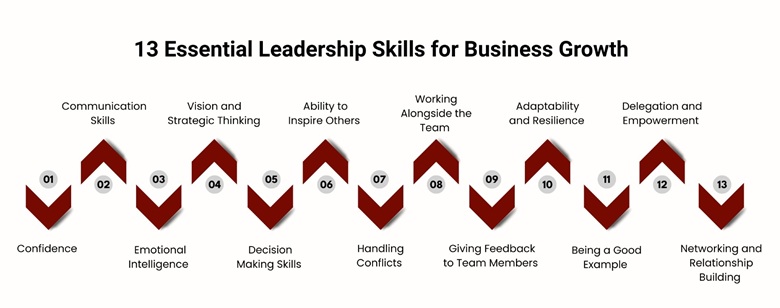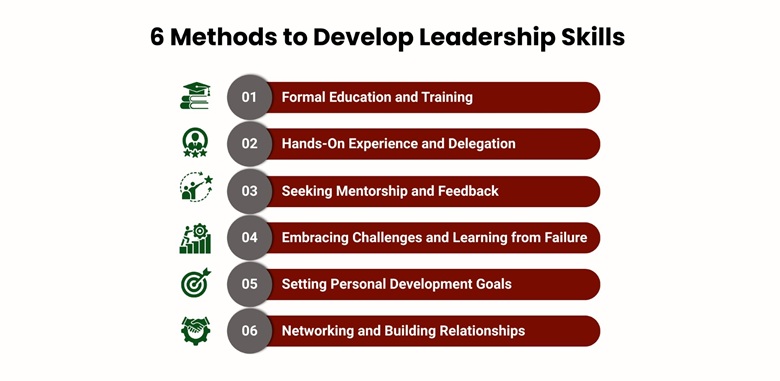Leadership is the heart of any thriving business. It guides teams, sparks innovation, and pushes companies toward success. With global engagement declining to 21%, businesses need leaders who can motivate and inspire. This article explores how to develop leadership skills that boost business strategy and create a positive workplace. We will share practical leadership development strategies, key qualities, and real examples to help you grow as a leader. Let’s get started on this journey to lead your business to new heights.
Great leaders stand out because of certain qualities that set them apart. These traits help them guide their teams and achieve business goals. Here are the main qualities every leader should aim for:
Emotional intelligence (EQ) is about understanding your own feelings and those of others. It helps you handle workplace challenges and solve conflicts fast. Leaders with high EQ build trust and create a supportive environment, which is key to business success.
Integrity means being honest and sticking to strong ethics. Accountability ensures you take responsibility for your actions. These traits inspire employees to follow your lead, strengthening the business culture.
Good leaders make smart decisions by analyzing data and assessing situations. They also solve problems quickly, keeping the business on track. This skill is vital when unexpected issues arise.
A clear vision gives your team a goal to work toward. Leaders with vision set strategies and guide everyone toward a shared future, aligning with business strategy for long term growth.
These qualities are not just born; they can be learned and improved with effort. Understanding them is the first step in leadership development strategies.
Beyond the basics, here are eight actionable ways to enhance your leadership skills for business growth. Each method builds on the qualities mentioned earlier.

Self-awareness begins with knowing your strengths, weaknesses, and emotions. Reflect on your actions and seek feedback from others to grow. Keeping a journal can help track your progress, making you a more empathetic and effective leader.
Learning is a powerful tool for leadership. Consider an online certification course or attend workshops on topics like communication and strategy. Reading books or following industry leaders expands your knowledge, equipping you to handle business challenges.
Great leaders communicate clearly and listen actively. Practice sharing ideas concisely and adjust your tone for different audiences. Listening to your team fosters trust and improves teamwork, aligning with business strategy.
Emotional intelligence helps you manage your emotions and empathize with others. Stay calm under stress and support your team during tough times. This skill creates a positive work environment, boosting morale.
Decision making improves with practice. Break decisions into steps: define the problem, gather information, evaluate options, and act. Learn from each outcome to gain confidence in leading your business.
Leaders face challenges daily. Approach problems proactively by finding root causes and brainstorming solutions with your team. This skill keeps your business moving forward through obstacles.
Teamwork brings diverse ideas together. Promote open communication and celebrate achievements to keep your team motivated. A collaborative culture drives innovation and supports business growth.
Leadership is a lifelong journey. Set personal goals, evaluate your progress, and seek mentors to guide you. Continuous learning keeps you adaptable and ready for new business opportunities.
These methods, combined with the earlier steps, form a strong foundation for leadership development strategies.
To lead a business to success, focus on these thirteen essential leadership skills. Each contributes to a thriving organization.

Confidence builds trust and encourages risk-taking. A confident leader communicates vision clearly, making tough decisions under pressure and inspiring loyalty.
Strong communication involves listening and speaking well. Clear messages unite your team, while open dialogue fosters transparency and focus.
High EQ (Emotional Quotient) means managing your emotions and empathizing with others. It resolves conflicts and boosts team morale, creating a productive workplace.
Vision sets goals and strategic thinking plans the path. Leaders with these skills anticipate market changes, keeping the business competitive.
Good decisions balance logic and intuition. Seeking input when needed ensures informed choices that guide the business forward.
Inspiring leaders motivate teams with passion and example. This fosters resilience and commitment, driving business growth.
Conflict resolution with empathy prevents issues from growing. Open communication builds trust, maintaining a positive team environment.
Engaging with your team builds relationships and trust. Being hands-on helps you understand challenges and support innovation.
Constructive feedback helps team members grow. A two-way process builds trust and encourages continuous improvement.
Adaptable leaders handle change and learn from failures. This creates a risk-taking culture essential for innovation.
Modeling integrity and dedication sets a standard. It motivates your team to uphold the same values, strengthening business culture.
Delegating tasks empowers employees to develop skills. This frees you for strategic work and builds a collaborative culture.
Networking opens opportunities and builds connections. Strong relationships inside and outside the team enhance business resilience.
These skills, when practiced, align with effective business strategy and leadership development strategies.
Here are six practical methods to grow your leadership abilities over time.

Take courses or workshops on leadership topics. An MBA or online training offers insights into strategy and communication, keeping you competitive.
Lead projects or delegate tasks to practice decision making. This builds your skills and those of your team, enhancing business performance.
Mentors provide guidance and feedback from peers to help you grow. This builds self-awareness and trust within your team.
Take on tough projects and view failures as lessons. This develops resilience and a growth mindset for business success.
Set goals to improve specific skills like communication. Regular reviews keep you motivated and aligned with your leadership journey.
Join industry groups to connect with peers. These relationships bring new ideas and support your business strategy.
These methods ensure continuous growth in leadership skills.
Real examples prove leadership skills in action. Here are three inspiring cases.
Steve Jobs, the co-founder and former CEO of Apple Inc., transformed the company into a global tech leader through his strong vision and passion. He believed in creating products that combined stunning design with user-friendly features, leading to iconic innovations like the iPod, iPhone, and iPad. His hands-on style pushed his teams to think differently, fostering a culture of creativity that set Apple apart.
Despite his demanding nature, Jobs’ ability to share a clear vision inspired employees to work hard and take risks. This focus on excellence helped Apple grow into one of the world’s most valuable companies, proving how vision and dedication drive business success.
Elon Musk, the CEO of Tesla, SpaceX, and other ventures, stands out for his ambitious goals and bold leadership. He aims to revolutionize industries with sustainable energy through Tesla’s electric vehicles and space exploration with SpaceX's reusable rockets.
Musk’s willingness to take big risks encourages his teams to push boundaries and embrace challenges, creating a culture of innovation. His hands-on approach, like working late nights with engineers, motivates employees to share his passion. Though his high expectations can create pressure, this risk-taking mindset has made Tesla a leader in the auto industry and SpaceX a pioneer in space travel, showing how inspiring leadership fuels growth.
Emma Walmsley, the CEO of GlaxoSmithKline (GSK), became the first woman to lead a major pharmaceutical company when she took the role in April 2017. She leads with transparency and a focus on inclusion, building a team culture where diverse ideas thrive.
During the COVID-19 pandemic, Walmsley showed adaptive leadership by steering GSK toward innovation, including a key partnership with Pfizer to develop a vaccine. Her emphasis on research and development in areas like oncology and respiratory diseases has kept GSK competitive. By empowering her team and fostering collaboration, she has driven the company to deliver life-changing medicines, proving how adaptive and inclusive leadership strengthens business outcomes.
These cases highlight diverse leadership styles driving business success.
Developing strong leadership skills is a journey that boosts business success. With 60% disengagement, leaders must inspire and guide teams effectively. By building qualities like emotional intelligence and vision, using leadership development strategies like education and feedback, and measuring impact with metrics, you can lead your business to growth. Start today, embrace challenges, and watch your leadership transform your organization.

CredBadge™ is a proprietary, secure, digital badging platform that provides for seamless authentication and verification of credentials across digital media worldwide.
CredBadge™ powered credentials ensure that professionals can showcase and verify their qualifications and credentials across all digital platforms, and at any time, across the planet.

Keep yourself informed on the latest updates and information about business strategy by subscribing to our newsletter.